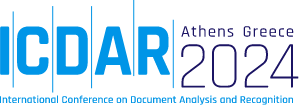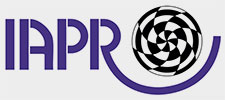List of Workshops
16th IAPR International Workshop On Document Analysis Systems (DAS)
- das2024.seecs.edu.pk/index.html
- The DAS workshop, previously held as an independent event, will now be offered as a satellite workshop of the International Conference on Document Analysis and Recognition (ICDAR). This integration marks a significant milestone, bringing together the specialized focus of DAS with the broader scope of ICDAR, enhancing the experience for participants and expanding the opportunities for knowledge exchange in the field of document analysis. DAS 2024 is poised to be the next landmark event in the IAPR-sponsored workshop series, focusing on the intersection of system-level perspectives and challenges in document analysis and recognition. The program for DAS 2024 is designed to showcase the most recent and impactful research and prototype systems in Document Analysis. In addition to the rich agenda of presentations, the workshop will feature keynote addresses that provide deep insights into core techniques and emerging trends in the field. Preceding the main workshop activities, attendees can participate in group discussions led by esteemed professionals, offering a comprehensive educational experience that caters to a broad academic audience.
Advanced Analysis and Recognition of Parliamentary Corpora (ARPC)
- https://hellenicocrteam.gr/arpc-workshop/
- Data-driven insights from archives have the potential to steer academic research in a variety of fields. The ARPC workshop attempts to address the growing importance of employing advanced recognition and analytical methods and tools to decode the complexities within legislative and administrative documents of parliamentary origin. The contributions will deep dive into cutting-edge OCR techniques for parliamentary corpora. Further attention will be placed into recognizing patterns, extracting meaningful insights and understanding the intricate dimensions of contemporary and historical parliamentary discourse. The relevance of this topic lies in its potential to bridge previously isolated domains of research, fostering interdisciplinary collaboration. By connecting history, political science, and linguistics, participants will unlock a richer understanding of legislative evolution, political trends, and linguistic nuances embedded in parliamentary proceedings. Due to the synergy of perspectives from diverse stakeholders, scientific discussions during the workshop are anticipated to yield outcomes that extend beyond individual disciplines. Envisioned outcomes include novel methodologies, identification of trends and the establishment of a collaborative network that transcends traditional academic silos.
Workshop on Computational Paleography (WCP)
- https://www.csmc.uni-hamburg.de/iwcp2024.html
- Computational paleography, An immerging interdisciplinary field, delves into applying computational methods to ancient handwritten documents. This field, at the intersection of computer vision, instrumental analytics, and paleography (the study of ancient scripts and their physical mediums), benefits immensely from technological advancements. It fosters unique collaborations across disciplines, uniting manuscript experts, computer scientists, and natural scientists. Traditional barriers in humanities, defined by chronology and geography, are rendered irrelevant when integrating optical, chemical, or computational analyses. Conversely, computer scientists eagerly apply their methodologies to tangible research questions, while natural scientists focus on both the physical aspects of written artefacts and their digital representations. Such collaborative efforts are essential for meaningful advances in studying ancient scripts. This workshop aims to convene specialists from these varied backgrounds, targeting professionals in computer and natural sciences, as well as humanists. Our objective is to facilitate the presentation of completed, or ongoing projects, fostering in-depth discussions. This convergence of diverse expertise not only addresses specific research queries on ancient manuscripts but also enhances the broader understanding and public accessibility of these cultural heritage treasures, enriching society as a whole.
2nd Workshop on Machine vision and NLP for Document Analysis (VINALDO)
- https://hellenicocrteam.gr/arpc-workshop/
Document understanding is an essential task in various applications areas such as data invoice extraction, subject review, medical prescription analysis, etc., and holds significant commercial potential. Several approaches are proposed in the literature, but datasets’ availability and data privacy challenge it. Considering the problem of information extraction from documents, different aspects must be taken into account, such as (1) document classification, (2) text localization, (3) OCR (Optical Character Recognition), (4) table extraction, and (5) key information detection.
In this context, machine vision and, more precisely, deep learning models for image processing are attractive methods. In fact, several models for document analysis were developed for text box detection, text extraction, table extraction, etc. Different kinds of deep learning approaches, such as GNN, are used to tackle these tasks. On the other hand, the extracted text from documents can be represented using different embeddings based on recent NLP approaches such as Transformers. Also, understanding spatial relationships is critical for text document extraction results for some applications such as invoice analysis. Thus, the aim is to capture the structural connections between keywords (invoice number, date, amounts) and the main value (the desired information). An effective approach requires a combination of visual (spatial) and textual information.
After the success of VINALDO 2023, in the second edition of VINALDO workshop, we encourage the description of novel problems or applications for document analysis in the area of information retrieval that has emerged in recent years. On the other hand, we want to highlight a particular topic namely “Multi-view and Multimodal approaches”. In fact, the VINALDO workshop aims to combine visual and textual information for document analysis, in this context, multi-view and multimodal methods have really an important advantage in dealing with different types of data. Thus, we encourage works that combine machine vision and NLP through Multiview or/and multimodal approaches. Finally, we also encourage works that combine NLP and computer vision methods and develop new document datasets for novel applications.The VINALDO workshop aims to bring together an area for experts from industry, science, and academia to exchange ideas and discuss ongoing research in Computer Vision and NLP for scanned document analysis.
Workshop on Comics Analysis, Processing and Understanding (MANPU)
- https://manpu2024.imlab.jp/
- Comics is a medium constituted of images combining text and graphics elements. This different visual information is used by the authors to narrate a story. Nowadays, comic books are a widespread cultural expression all over the world and especially in the United States, European countries, and Asian countries. So, the terms of Comics include several categories such as Mangas, American Comics, and Franco-Belgian “Bandes Dessinées”. Each category has its own graphic style. From the research point of view, comics images are attractive targets because the structure of a comics page includes various elements (such as panels, speech balloons, captions, leading characters, text, onomatopoeia, and so on). The design of these elements strongly depends on the creativity of the author and his graphic universe. Consequently, the drawings present a very large variability. Therefore, comics image analysis is not a trivial problem and is still immature compared with other areas of application of image analysis and pattern recognition. Comics offer many challenges for researchers. For example, the detection and recognition of the characters in a comics page are not trivial since the main character can be a human being, an animal, or even an imaginary character. In this context, the “pattern recognition” task is a tricky problem. Comics analysis has aroused interest among researchers. The number of scientific papers dealing with comics analysis has significantly increased in international conferences and journals during the last ten years. The original approaches proposed in these papers in the area of computer vision, pattern recognition, and machine learning, show that comics analysis and understanding can be considered as a research topic. Moreover, the drawings of some comics are very similar to the ones of cartoons. So, some approaches can be applied to both media.
Automatically Domain-Adapted and Personalized Document Analysis (ADAPDA)
- https://sites.google.com/view/adapda-ws/
- Document Analysis (DA) technologies are becoming increasingly pervasive in our daily life due to the digitalization of documents (both in the cultural and industrial domains) and the widespread use of paper tablets, pads, and smartphones to take notes and sign documents. In this respect, high-performing DA algorithms are needed that are able to deal with digitalized documents from different writers, in different languages (including ancient languages, modern slang terms, or writer-preferred abbreviations and symbols), and with different visual characteristics (due to the paper support and the writing tool), often very peculiar to the application domain. In this respect, domain adaptation and automatic personalization strategies are worth investigating to boost the performance of DA techniques in the scenarios mentioned above, which are of great cultural, practical, and economic interest. Nonetheless, in some application contexts, writer-specific data may contain sensitive information (either personal or business-related). In the sight of this, specific privacy-preserving solutions and lightweight adaptation strategies that can be performed onboard on personal devices must be considered when designing personalized DA techniques.
This workshop aims at gathering expertise and novel ideas for personalized DA tasks such as, for example, Handwritten Text Recognition, Handwritten Text Generation, Writer Identification, Writer and Signature Verification, and Handwriting Analysis. In particular, it welcomes contributions on training and adaptation strategies of writer, language, and visual-specific models, new benchmarks, and data collection strategies to explore the mentioned tasks in a personalized setting, as well as related works on the personalized DA topic.
Call for Workshops
The ICDAR2024 Organizing Committee invites proposals for workshops that will be held together with the ICDAR-2024 main conference.
The purpose of the workshops is to provide a comprehensive forum on topics that will not be fully explored during the main conference and to encourage in-depth discussion of document analysis-related technical, application, and community issues. In order to facilitate innovative collaborations and engagements between members of other research communities and the document analysis community, Workshop Chairs also strongly encourage other research communities to submit proposals on recent and other important topics that are used by the document analysis community.
Proposal Submission
Proposals should clearly specify/discuss the following:
- Workshop title
- The MAIN CONTACT organizer’s information (name, affiliation, and email address)
- Scope and motivation. A brief description of the workshop, suitable for inclusion in the conference brochure
- Preference for the duration (full day or half day) and date (August 31 and/or September 1, 2024)
- Workshop description that includes acceptable submission topics, specifying if the workshop will include papers in conference proceedings.
- Short CV of organizers, describing relevant experience and qualifications
- Relevance for ICDAR. Description of how this proposal relates to the main ICDAR conferences and previous workshops appearing at ICDAR conferences in the previous two years
- Anticipated target audience as well as expected number of attendees
*Submissions require at least two organizers from different organizations. Workshop proposals should be submitted in the form of a single PDF, up to 4 pages.
Review Criteria
We encourage workshop proposals aimed at creating or improving the community. Proposals will be evaluated by the workshop chairs and conference organizers using the following criteria in reviewing submissions:
- Relevance
- How well the workshop complements the main conference
- The community’s interest in the topic.
- Novelty
- Is the workshop topic new and innovative? Will it bring new discussion or momentum?
- Has the workshop been presented at other conferences?
- Diversity and inclusion
- This includes diversity in the organization teams and diversity of topics.
- We encourage workshop topics that address issues of Diversity and Inclusion in document analysis applications.
- Social impact and ethical consideration
- The potential impact of the topics in the proposal.
- The social impact of the workshop on document analysis and recognition field.
- Organization
- Experience of the organizing team and dedication of the main organizers.
- Preparatory work for having an engaging workshop.
Notes
- ICDAR2024 workshop organizers are responsible for the scientific organization and advertising of the event. Particularly, they are in charge of constructing a web page and putting it on-line by January 20, 2024.
- The ICDAR main conference organizers will handle the workshop registration and provide workshop space, coffee breaks and other facilities required to organize workshops (e.g. a room, a projector, and a screen).
- If a workshop incurs costs for invited speakers, the workshop organizers are required to bear that cost. The workshop organizers may solicit sponsorship to cover the relevant costs.
- Workshop organizers can decide on their own deadlines for submission and reviews. However, if they want the workshop papers to be included in the conference or workshop proceedings they must comply with the following rules:
- The papers must be peer-reviewed
- The papers must meet the requirement of ICDAR2024 proceedings style, format, and length
- The camera-ready due date of your workshop must be set before or the same as the main conference’s
- Each accepted paper requires at least one author to perform a full registration.
- On-line presentation is allowed but not encouraged.
- The registration fee for only workshop participatants will be discounted.
Submission Guidelines and Inquiries
All proposals should be submitted by email to the Workshop Chairs:
workshops-chairs@icdar2024.net
For any inquiries you may have regarding the workshops, please contact the Workshop Chairs.
Important Dates
- Workshop Proposal Due date: November 25, 2023
- Acceptance Notification: December 10, 2023
- Workshop web page online: January 20, 2024
- Dates of Workshops: August 31- September 4, 2024
Workshop Chairs
- Harold Mouchère, Nantes Université, France, harold.mouchere@univ-nantes.fr
- Anna Zhu, Wuhan University of Technology, China annazhu@whut.edu.cn





